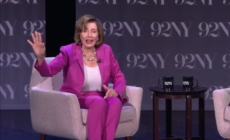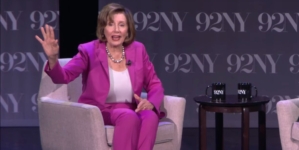-
Canada’s Plan To Avoid Trump’s Tariffs Takes Shape - 24 mins ago
-
What are the Symptoms of COVID-19? Latest Strain Presents Like the Common Cold - 39 mins ago
-
U.K. Bans Puberty Blockers for Teens Indefinitely - about 1 hour ago
-
Nancy Pelosi Heckled for Over a Minute at Event: ‘I’m Used to This’ - about 1 hour ago
-
Yankees Sign Free Agent Pitcher to Bolster Bullpen: Report - 2 hours ago
-
Why Luigi Mangione’s Reddit and Instagram Were Taken Down, but Not His Goodreads? - 2 hours ago
-
Jason Kelce’s Nickname For Pregnant Wife Kylie Kelce - 2 hours ago
-
Trump Chooses Kari Lake to Lead Voice of America - 3 hours ago
-
First Drive Review: 2024 Dodge Charger Daytona Scat Pack - 3 hours ago
-
UCLA police chief, blasted for security lapses that led to protest violence, is out - 3 hours ago
Black Friday 2024: Are Retailers Struggling to Attract Shoppers?
Over the years, Black Friday has become a highly anticipated event, known for its massive sales and reduced prices. However, many believe that 2024 has been more challenging for U.S. retailers due to several reasons, some of which being the shorter holiday season and heightened economic pressures.
As a result, the push to spread sales comes earlier this year, as the 2024 holiday season is five days shorter than in 2023, leaving less time to meet revenue targets.
In an attempt to attract shoppers, some big retailers have launched holiday promotions earlier this year, with Walmart launching its “Deals for Days” event on November 11, and Amazon and Target beginning their Black Friday promotions in mid-November.
More consumers have become wary of Black Friday deals, as growing evidence shows that many of these offers don’t provide the significant discounts shoppers expect.
WalletHub’s 2024 analysis reveals that 41 percent of items labeled as Black Friday deals are priced the same as at other times of the year, while 26 percent are actually more expensive.
Still, Black Friday remains a significant event in the retail calendar, with projections indicating that U.S. sales in 2024 will reach $10.8 billion, marking a 9.9 percent increase from the previous year.
Newsweek reached out to retail experts to provide insights into Black Friday’s shifting role, and its implications for both consumers and businesses.

Photo Illustration by Newsweek/Getty Images
Nate Shenck, BCG’s Global Lead for Retail (Boston, Massachusetts)
The BCG Black Friday Consumer Study revealed that 97% of U.S. consumers are aware of Black Friday, with shoppers planning to spend at levels similar to last year—highlighting the event’s continued importance on the retail calendar.
Although concerns around inflation are easing, there is continued consumer emphasis on price and value, particularly in nonessential categories. This suggests we are likely to see high competition across key Black Friday categories like apparel, accessories, electronics, and games. And, shoppers will remain discerning of prices—over 90% of US Black Friday shoppers reported that they are planning to search for deals prior to the day of purchase.
The prevalence of early research by consumers is likely influenced by the abundance of retailers and channels offering similar products and promotions. This fact also suggests it is important this season for retailers to offer clear, straightforward deals and to launch them early, especially given the 2024 holiday shopping season is significantly shorter than last year (and actually as short as it can be), with five fewer days between Thanksgiving and Christmas.
Anjee Solanki, National Director, Retail Services & Practice Groups at Colliers U.S. (San Francisco, California)
Black Friday is no longer the shopping juggernaut it once was, and retailers clinging to the past are destined to lose out. Early shopping trends, relentless inflation, and a seismic shift in consumer priorities have fractured the once-mighty event into another cog in a sprawling holiday sales machine. The winners in this new landscape won’t be those offering doorbuster deals but reimagining the shopping experience, blending value, immersion, and omnichannel convenience to stay ahead of the curve.
Shipping delays and logistical challenges this holiday season drive more consumers back to brick-and-mortar stores to avoid the uncertainty of late deliveries.
At the same time, retailers are adapting to omnichannel strategies, allowing shoppers to transition between online and in-store experiences seamlessly. This approach not only provides greater convenience and certainty but also reinforces the critical role of physical stores in supporting broader holiday shopping habits, even as online sales continue to grow.
This year, 10% more shoppers aim to finish their holiday shopping by mid-December, setting the stage for a busy post-Thanksgiving rush. Many consumers (78%) started holiday shopping earlier than usual to take advantage of early deals and promotions. Retailers responded by stocking holiday merchandise as early as August. This shift is diluting the traditional Black Friday rush as shoppers spread their purchases over a more extended period.
Although inflation has eased, high prices remain a significant concern for 90% of holiday shoppers. Many focus on essentials or delayed purchases rather than splurging on big-ticket items.
Despite this price sensitivity, consumers, mainly Gen-Z and Millennials, prioritize dining out and spending on services, even in the food and beverage sector, which inflation has hit hardest.
This season, an estimated 200 million shoppers will flock to malls and shopping centers for holiday purchases and enjoy seasonal activities and immersive experiences, contributing to a 6% rise in food and beverage sales. With total seasonal spending projected to reach $1.66 trillion and 70% of shoppers feeling financially stable or better off than last year, retailers have a unique opportunity to engage consumers through a holistic blend of shopping, dining, and festive experiences.
Zachary Robichaud, Lecturer, Ted Rogers School of Retail Management, Toronto Metropolitan University (Toronto, Canada)
Inflation has undoubtedly impacted disposable income, leading many consumers to prioritize essential purchases over discretionary spending. Further, the increased ease and availability of products through various channels (i.e., online, mobile, in-store, etc.) have diluted the urgency traditionally associated with Black Friday.
The reduction in discretionary spending has made shoppers more deliberate, favouring value and sustainability over impulsive buying. For retailers, this underscores the need to innovate, enhance omnichannel experiences, and align with consumers’ shifting expectations, such as personalized offers and seamless digital integrations, to remain competitive in this changing environment.
Dr. Don Roy, Professor of Marketing, Jones College of Business (Murfreesboro, Tennessee)
The Christmas shopping season has undergone significant changes in recent years, driven by shifts in consumer behavior and technological advancements. Three factors have reshaped the role of Black Friday for retailers:
Extended Holiday Shopping Season: Retailers have increasingly pushed the start of the holiday shopping season into October. Events like Amazon’s Prime Big Deal Days or Black Friday in October sales have encouraged earlier shopping.
Decreased Significance of Black Friday: The iconic scenes of long lines and frenzied shoppers on Black Friday have diminished. Many consumers now prefer online shopping for convenience, safety, and access to similar or better deals.
Growth of E-Commerce:The pandemic accelerated a shift to e-commerce, and it remains a dominant force during the holiday season.”
Source link





















